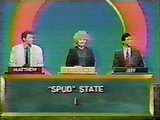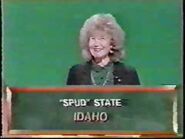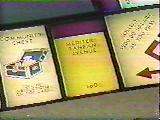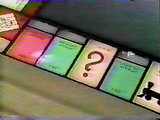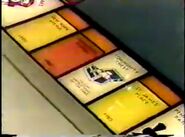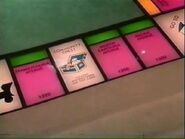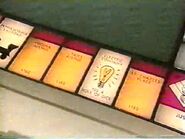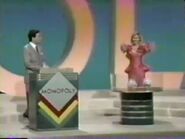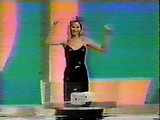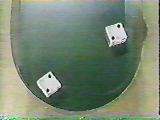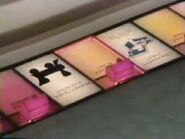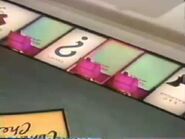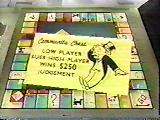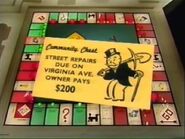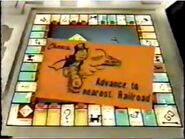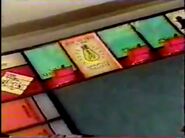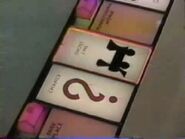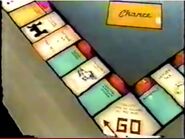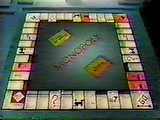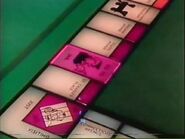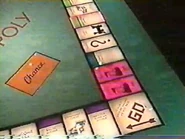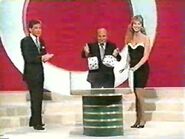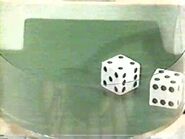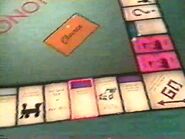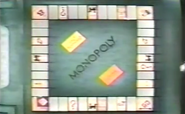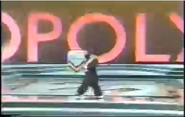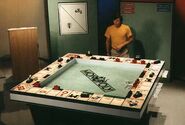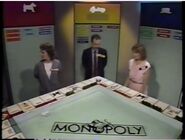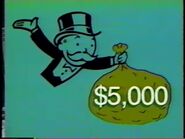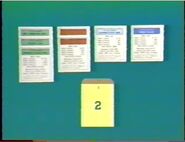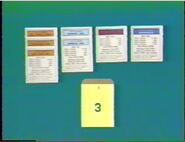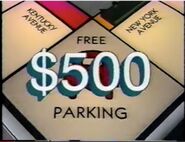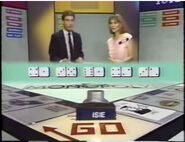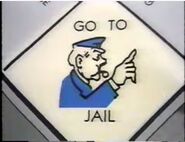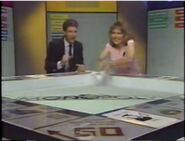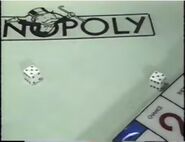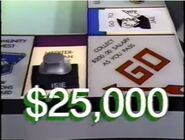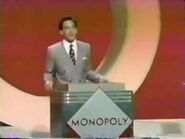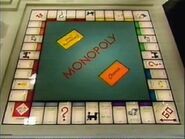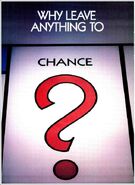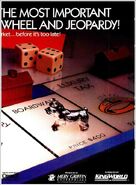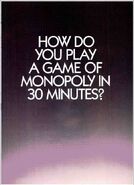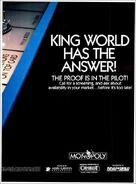| Hosts | |
| Marc Summers (1987) Peter Tomarken (1989) Mike Reilly (1990) | |
| Hostesses | |
| Patty Maloney as "Rich Uncle Pennybags" (1989) Kathy Davis (1990) Kathy Karges (1990) Michelle Nicholas (1990) | |
| Announcers | |
| Don Morrow (1987) John Harlan (1989) Charlie O'Donnell (1990) | |
| Broadcast | |
| Runthrough: 9/28/1987Unsold Pilot for Daily Syndication: 1989 ABC Primetime: 6/16/1990 – 9/1/1990 | |
| Packagers | |
| Merv Griffin Enterprises/King World | |
Monopoly was a short-lived 1990 game show by Merv Griffin that had a long development history. It was based on the world's most famous, popular and classic board game of the same name. At the time, this was paired up with Super Jeopardy! on Saturday Nights.
Gameplay[]
Main Game[]
Round 1[]
Three contestants, playing as red, gold, and green, competed to win monopolies on the Monopoly board. Starting from "Go" and moving clockwise one property at a time, each colored property went up for grabs. To win the property and its price (as money), a player had to answer a question using a crossword puzzle-like clue beginning with a given letter provided by Reilly (the letter changed for each side of the board). Wrong answers deducted the property's price from the player's score. If no one answered a clue correctly, another question with another clue would be asked for the property, but the money that could be gained or lost on that question/clue was halved.
Here are the properties, from least expensive to most expensive:
| Property | Value |
|---|---|
| Mediterranean Avenue | $60 |
| Baltic Avenue | $60 |
| Oriental Avenue | $100 |
| Vermont Avenue | $100 |
| Connecticut Avenue | $120 |
| St. Charles Place | $140 |
| States Avenue | $140 |
| Virginia Avenue | $160 |
| St. James Place | $180 |
| Tennessee Avenue | $180 |
| New York Avenue | $200 |
| Kentucky Avenue | $220 |
| Indiana Avenue | $220 |
| Illinois Avenue | $240 |
| Atlantic Avenue | $260 |
| Ventnor Avenue | $260 |
| Marvin Gardens | $280 |
| Pacific Avenue | $300 |
| North Carolina Avenue | $300 |
| Pennsylvania Avenue | $320 |
| Park Place | $350 |
| Boardwalk | $400 |
Playoffs[]
Each time the last property of a colored group was taken, control of the monopoly would then be up for grabs. If one contestant earned all the properties in a group, then that contestant earned the monopoly. However, since split/divided-ownerships were never allowed unlike the normal game, if two players had properties in the group, a series of playoff questions/clues between those two came into effect. Each of the two contestants needed as many right answers as opposing properties in the group. No money changed hands on these clues. If a contestant answered a playoff question/clue incorrectly, the opponent automatically received credit for a correct answer. If all three players had one property each, Reilly would give a toss-up question/clue to all three. The player with the right answer would get to take one property (and thus, decided whom to play against (should anyone miss, that contestant was disqualified and lost his/her property)). The two contestants with properties then had a separate playoff as above. After all this, whoever ended up with the monopoly earned the combined price of all the properties in that group.
Here are the monopolies, and their total values:
| Property | Value |
|---|---|
| Purple | $120 |
| Cyan | $320 |
| Magenta | $440 |
| Orange | $560 |
| Red | $680 |
| Yellow | $800 |
| Green | $920 |
| Blue | $750 |
After claiming all the monopolies, the contestants (during a commercial break) then decided how to build houses and hotels on properties, using the cash won by answering questions/clues and making monopolies. Houses cost $50 each, and hotels cost $250, and, as per the board game rules, properties had to be developed evenly (i.e. you can't have two houses on any one property unless each property has at least one).
Round 2: Big Money Round[]
After all development had finished, the three contestants would then have a chance to earn money as a flashing neon cursor moved around the board via the roll of the dice. The hostess rolled the dice, moving the cursor the corresponding number of spaces.
Depending on where the cursor landed, various outcomes were possible. They were:
- Regular Properties – Host Reilly read a question/clue to the player who owned the property. A correct answer to the question/clue earned the rent (there was no penalty for a wrong answer). If the owner's response was not correct, the other two players could buzz in for a chance to earn the rent (risking losing money for a wrong answer). NOTE: Should a property have no real estate whatsoever, the mortgage value in the regular game became the rent value.
- Chance and Community Chest – Like the normal game, a card was drawn (a computer effect of the card appeared to the home viewers) and it either effected the player(s) score(s) or took the neon cursor to anywhere on the board. Some of the cards were from the actual board game, while the rest were created exclusive to the game show.
- Utilities (Electric Company and Water Works) – Host Reilly read a toss-up clue to all three players. The first one to buzz in with a correct answer won $100 times the total number last rolled (example: the dice had a 5 rolled so $100 x 5 is $500)
- Railroads (Reading, Pennsylvania, B & O, and Short Line) – When any one of these railroad spaces was landed on, it opened the door to a "Hostile Takeover" situation. Host Reilly read a clue to all three players. The first one to buzz in with the correct answer could move the cursor to the first property of any opponent's monopoly. The player then had to answer one clue unopposed for each property in the monopoly, a correct answer advancing the cursor to the next property. Completing the contract stole the monopoly from that opponent. If a player failed to answer a clue, then they were penalized the rent for the property on which the cursor was, and the owner of the property received that rent.
- Free Parking – Reilly read a clue to all three players. The one with the correct answer won a jackpot which started at $500 plus money paid up by the contestant(s) in terms of taxes, fines and things.
- Go to Jail – When that space was landed on, all three players were each fined $250.
- GO – Landing on or passing Go added $200 to all three contestants' totals.
- Taxes – Luxury Tax cost all players $75 each, while Income Tax charged each of them 10% of their cash total.
A signal sounded when one minute remained in this round. When time ran out, all the contestants sold back houses and hotels (for face value) on monopolies they now owned. The player with the most money at the end of the round won the game, kept the money, and moved on to the bonus round.
The Once Around the Board/Block Bonus Round[]
The champion then had a chance to win $25,000 or $50,000 by completing one trip around the board. Before starting the round, they selected one space on the second row, one space on the third row, and two spaces on the fourth row to be "Go to Jail" spaces (along with the one in the corner). The spaces that became "Go to Jail" spaces plus the one in the corner all turned red. The champion then had up to five rolls of the dice to move the cursor, starting from "Go," once around the board without landing on any "Go to Jail" space. Rolling doubles gave them an extra roll. Each space traversed earned the champion $100. They could stop and take the money after any successful roll, but landing on "Go to Jail" lost the bonus money and if they fell short of the "GO" space, they still got the $100 for each space passed. However, passing "Go" earned $25,000, and landing on "Go" exactly earned $50,000 (which never happened).
1989 Pilot Rules[]
Round 1[]
Instead of going around the board, Monopolies were captured at random; but they were not revealed until after they were captured. Plus, instead of answering a number of clues based on the number of properties involved, it took two correct answers on all Monopolies to capture them as well as the total amount of each; also the letters changed for each new Monopoly. Incorrect answers eliminated the player who gave one from the Monopoly.
Round 2[]
The second round is pretty much the same as in the series, except with these differences:
- There was no hostess rolling the dice next to the host. The dice were rolled offstage by a stagehand.
- Instead of just a neon light to mark the players' position, Patty Maloney, posing as Rich Uncle Pennybags, walked around the board. Maloney is best known for playing Darla Hood in Hanna-Barbera's animated version of the Our Gang/Little Rascals comedies, which King World co-produced for ABC.
- Each contestant also owned a Community Chest space.
- On a steal on individual properties, a successful steal on the clue just missed allowed the player to steal the Monopoly by getting one or two more clues right; similar to the Railroad spaces.
- Though played the same way, the Railroad spaces were replaced with "Takeover" spaces.
- When a contestant stole a Monopoly from another player, not only was the Monopoly's value added to the stealing contestant's score, but it was deducted from the original owner's score.
- Halfway into the round during a second break, the contestants could use the money to improve their properties.
The Once Around the Board/Block Bonus Round[]
The rules were the same except the payoffs were smaller; each passed space was worth $50 while making it around the board won $10,000. There was no bonus for landing exactly on GO.
Finally, there were returning champions.
Pictures[]
1987 Runthrough Rules[]
NOTE: A runthrough is a crude mockup of how the game should be played. If it's accepted, the money is spent on an actual set for a full pilot.
The front game was altered from what we know:
- The three contestants were represented not only by color (blue instead of green in this instance), but by three of the tokens used in the actual game: Dog, Car, and Hat.
- Each player started with a bank of $5,000. Before the game, each contestant rolled the dice. The highest number got to choose from three envelopes, the second highest chose from the remaining two, and the lowest took the leftover one. Each of those envelopes contained either seven or eight properties. This made sure that each player had one monopoly with a second contestant having two but not having a stake in Boardwalk/Park Place. Additionally, three of the other four non-monopolized properties were all in 2-to-1 ratios for one contestant, except for Boardwalk/Park Place.
- "Rich Uncle Pennybags" assigned one house to each of the monopoly properties. Each player had the option of adding two houses if they so desired.
- Once the dice were rolled, several elements were put into play:
- If a player landed on an owned space that was part of a Monopoly, they simply paid rent to the owning contestant if they didn't own the property.
- If a player landed on an owned space that was not part of a Monopoly, the one who owned two of the three properties was asked a trivia question with two possible answers. If they were correct, they received the third property and claimed the Monopoly. If they were incorrect, the opponent received the two properties to complete the monopoly. In either case, the new owner of the monopoly could improve it with up to two sets of houses if they desired, paying the normal game rates for the wanted amount of houses for that property.
- If they landed on Free Parking, they won the money currently in the Free Parking pot, which started at $500.
- If they landed on a railroad, the contestant would be moved to a different space depending on the result of a mini-game. In Round 1, the mini game involved them choosing from three hidden selections, with the chance of refusing one selection but being stuck with the next one. In Round 3, the mini game involved them picking a letter in the word "MONOPOLY" and moving to the designated space.
- If the contestant was assigned to jail, on their next turn they were asked a trivia question with two possible answers. If they were correct, they were released. If they were incorrect, they had to pay $500 to Free Parking and they were released.
- If the contestant landed on Community Chest, they were asked a trivia question with two possible answers. If they were correct, they won a set of houses. If they were incorrect, they lost a set of houses.
- If the contestant landed on Chance, they were asked a trivia question with two possible answers. If they were correct, they would go to Free Parking. If they were incorrect, they would move to Luxury Tax and lose $100 times the roll of the dice.
- Doubles gave the contestant another roll of the dice.
For Round 2, contestants (during the commercial) could add two more houses on any of their monopoly properties, as long as their bank did not go below $2,000. Additionally, $250 was added to Free Parking.
For Round 3, contestants (during the commercial) could improve as much as the wanted, as long as they could afford it. Additionally, some rules changed:
- All contestants received the cash values of their properties and improvements as an augment to their current banks. They kept the properties.
- Another $250 was added to Free Parking.
- Chance and Community Chest were now wagering spots, where contestants could add or lose money in their bank based on their bets on a three-choice trivia question.
- All rents doubled.
The bonus was similar to what we know, except each space was worth a prize instead of cash. Landing on or turning a corner was worth $1,000. Finally there were six extra Go to Jail spaces instead of four, all placed at random. As in the aired version, passing GO was worth $25,000 and landing exactly on GO was worth $50,000.
Gallery[]
More Series Pictures[]
Trade Ads[]
1989 ad/Version 1[]
1989 ad/Version 2[]
1990 ad[]
1990 Ad[]
Studio[]
Hollywood Center Studios, Los Angeles, CA
Episode status[]
The series is intact, with the 1989 pilot and all episodes of the series in the trading circuit. Several episodes and portions of others are on YouTube as well as the 1987 runthrough (which was uploaded to YouTube by Wink Martindale) and the 1989 pilot.
International Version[]
A Welsh version of this show, hosted by Derec Brown, ran for a brief period on S4C in 1992.
Rating[]
Inventor[]
Based on the board game of the same name by Charles B. Darrow & Parker Brothers (now Hasbro).
Music[]
Merv Griffin & Mort Lindsey
Theme Lyrics (Full)[]
(Chorus):
M-O-N-O-P-O-L-Y! (2X)
Monopoly! (4x)
M-O-N-O-P-O-L-Y!
Roll the dice, it's paradise!
But if you fail, you go to jail!
Rollin' on the boardwalk
(Chorus), I'm just a-visiting
(instrumental break)
Gonna pass GO now
(Chorus), Puttin up my hotels
M-O-N-O-P-O-L-Y!
Monopoly!
NOTE: The theme could also be heard on the soundtrack called The Best of TV Quiz and Game Show Themes by Game Show Network released in 2000 (under track #9).
Additional Pages[]
Monopoly/Video Gallery
Monopoly/Quotes & Catchphrases
See Also[]
Links[]
1987 Monopoly Pilot @ The Game Show Pilot Light
Rules for Monopoly
Monopoly Rules @ Loogslair.net
James Vipond's Monopoly Page



